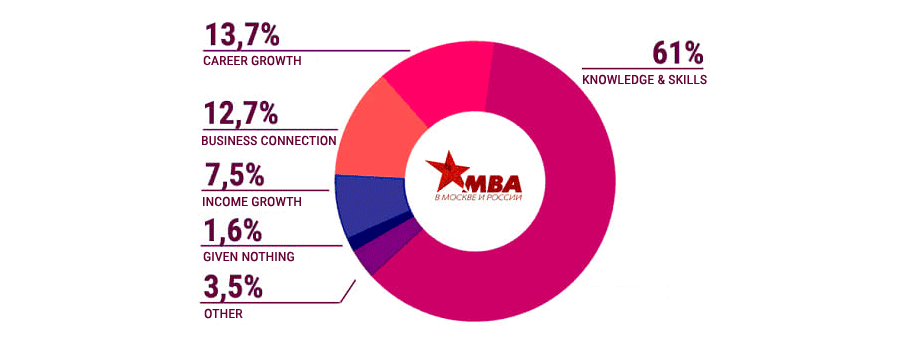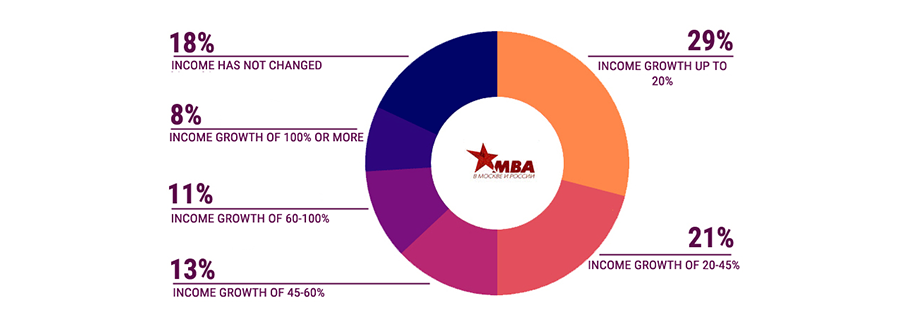The MBA in Russia: Its Current State
While the first MBA programs were created in the early 1900s, the degree wasn’t formally introduced in Russia until 1988. Today, the Russian market boasts 120 to 130 business schools or faculties embedded within university departments, and the industry is served by the Russian Association for Business Education (RABE).
Over the past three decades, the Russian MBA has evolved substantially. Four factors have had a particularly strong impact:
Competition. Many of the major educational players today are corporate universities run by organizations across a range of sectors. These include financial institutions such as National Bank, SberBank, and VTB Group; energy companies ROSATOM, Gazprom, and Lukoil; internet company Yandex; and aerospace corporation Roscosmos. As the number of corporate players has risen, the number of universities delivering MBA programs has declined by approximately 15 percent compared to a decade ago.
Rogue programs. The level of competition is compounded by the rampant growth of offerings that mimic the MBA. Managers at all levels, as well as entrepreneurs, are inundated with offers from “leading” pseudo-business schools offering cheap and fast MBAs programs.
Accreditation. Over the past decade, Russian business schools have shown a growing interest in pursuing various global accreditations, a process that requires them to meet certain standards of quality. Indeed, IBS Moscow, the business school of RANEPA University, under the leadership of Sergey Myasoedov, became the first Russian school to earn AACSB accreditation, and a number of other Russian business schools currently are in the initial AACSB accreditation process.
The coronavirus. The onslaught of the pandemic forced schools around the world to pivot to delivering education over virtual platforms. While Russian institutions made the switch quickly, school administrators know that online training is not a panacea and that many corporate and government leaders still prioritize face-to-face training and communication. Nonetheless, school administrators believe that virtual education and blended learning will be components of Russian business school education in the future.
To track these and other changes within Russia’s MBA and EMBA market, MBA.Su, an information and directory portal for business education in Russia, conducts an annual survey of recent graduates. MBA.Su then uses this survey as the basis for its Narodnyj Ranking. Sponsored by Russian business media, the ranking assesses how satisfied graduates are with their MBA and EMBA programs based on four indicators: income growth two to four years after graduation, career growth, business connection, and personal and professional development.
For MBA.Su’s most recent survey, which was conducted online between February and May 2020, participants included 1,260 MBA and EMBA graduates who completed their programs between 2016 and 2018. They represented 52 business schools from Moscow, St. Petersburg, Kazan, Nizhny Novgorod, Samara, Rostov on Don, Yekaterinburg, Novosibirsk, Irkutsk, and Vladivostok. Together, these participants represented about 96 percent of Russia’s national MBA and EMBA program market—and provide a very clear picture of the market’s current state.
The Value of an MBA
For the largest group of respondents by far—61 percent—the main benefit of an MBA/EMBA degree is gaining the knowledge and skills necessary to be successful in the workplace. (See Figure 1.) Other top benefits include achieving career growth (cited by 13.7 percent of respondents), making business connections (12.7 percent), and spurring income growth (7.5 percent).
In the most recent survey, many survey respondents also shared their thoughts about how the MBA degree has affected their lives and careers. For instance, one graduate notes that all the benefits slowly coalesced—first came business knowledge, then a business network, then career growth. “Then I opened my own company as an individual entrepreneur, [which] ultimately led to an increase in income.”
Figure 1. Main Results of MBA Education

The No. 1 benefit of earning an MBA, according to recent graduates of Russian business schools, is gaining the knowledge and skills to do their jobs.
Another describes how the program led to greater efficiency and knowledge. “Now there are no problems in business that I do not know how to solve. I can always create my own solution (and this is possible thanks to enhanced critical thinking skills).”
Other respondents express their appreciation for achieving new levels of self-realization, receiving assistance in starting their own businesses, improving the breadth and consistency of their thinking, and developing a sense of drive.
A Boost in Earnings
While a relatively low number of participants cite income growth as the prime benefit of their MBA experience, that figure still represents a 25 percent jump from the previous survey. And, around the world, individuals historically cite netting higher incomes as an important reason that they decide to pursue advanced degrees.
Currently, for most students who graduate from Russian schools with MBA/EMBA degrees, the median income growth is 30 percent. However, there is a widening gap between graduates who experience a medium level of growth and those who enjoy a high level. One reason for that gap could be the quality and cost of the programs that students attend. For instance, if graduates earn a degree from the Moscow School of Management Skolkovo—the most expensive MBA program in the Russian market at about €95,000 (115,000 USD)—they can expect income growth that will be several times higher than that of a graduate whose MBA cost €2,200 (2,663 USD).
Even so, 29 percent of respondents say their incomes have risen by up to 20 percent, and more than half of respondents have seen even higher growth. (See Figure 2.) Only 18 percent say their earnings have not changed at all they earned their degrees.
Figure 2. Income Dynamics After Business School Graduation

The overwhelming majority of graduates from Russian business schools see income growth of at least 20 percent after obtaining their MBA or EMBA degrees.
Despite the variances, 91 percent of recent graduates say they are satisfied with their jump in earnings. Those who rate their satisfaction the lowest tend to be line managers who have failed to improve their career positions after earning their degrees. (See Table 1.) One likely explanation for this failure is that they were not sufficiently ready to pursue the MBA when they enrolled, and so they did not reap all its benefits. However, they most likely have been able to enjoy related benefits, such as connections with other alumni and access to lifelong learning opportunities such as executive education and skills-based courses.
Table 1. Satisfaction Ratings by Title
| INCOME GROWTH ESTIMATES | LINE MANAGERS | MIDDLE MANAGERS | TOP MANAGERS | BUSINESS OWNERS |
| EXCELLENT | 20% | 52% | 58% | 65% |
| GOOD | 33% | 29% | 30% | 23% |
| SATISFACTORY | 13% | 12% | 7% | 5% |
| UNSATISFACTORY | 34% | 7% | 5% | 7% |
Survey respondents rate their satisfaction with the income growth they achieved after earning their MBA/EMBA degrees.
Additional Advantages
Survey respondents who obtained their degrees within the past few years also generally are pleased with the benefits they have received in other areas:
Career growth. Eighty-eight percent say they are satisfied with their career growth. Of these, 47 percent rate their growth as excellent, 30 percent as good, and 11 percent as satisfactory.
To a large extent, this satisfaction can be attributed to the numbers of graduates who have moved up in the ranks from line managers or mid-level managers to senior managers or business owners. Sixty percent to 90 percent of the graduates in these two categories have improved their career positions, and most also have increased their incomes. Eighteen percent of senior managers say they have launched their own businesses after graduating. In addition, most respondents who are still in their current career positions have increased their income post-graduation.
Business and professional connections. Respondents report that their enhanced networks represent a long-term resource that they expect will provide them with new career opportunities, business prospects, and business development opportunities. Eighty-five percent of graduates consider these connections excellent, and another 8 percent rate them as satisfactory.
Personal and professional development. Almost all respondents—98 percent—express satisfaction in this category, and 89 percent are very satisfied. And as lifelong learning becomes a hallmark of business education, this benefit is taking on even greater importance. Graduates who are satisfied with their initial education experiences are more likely to return to business schools over the course of their careers as they seek a variety of interpersonal and managerial enhancements.
Long-Lasting Benefits
As the survey indicates, MBA and EMBA degrees confer deep and lasting benefits on their graduates. Students gain the competencies they need to succeed while also developing networks and pursuing lifelong learning opportunities that will enable them to climb the executive ladder or run their own businesses. Such opportunities include international study programs their schools have created with partner institutions.
The results of the MBA.Su survey reinforce the extent to which graduate business education enhances the careers of those who earn degrees. Similarly, these benefits do more than just improve the position of Russian professionals in an increasingly competitive world market. They also raise the level of excellence of businesses across the entire country.
